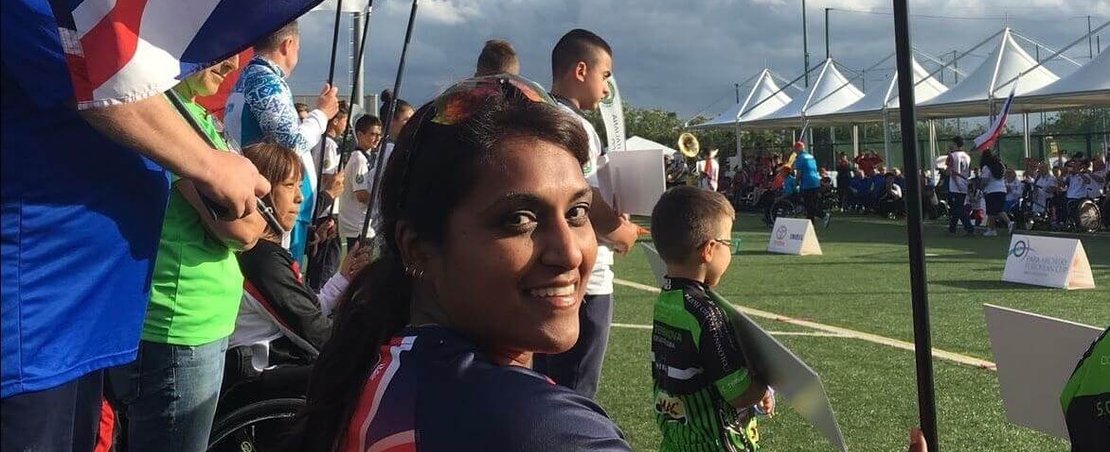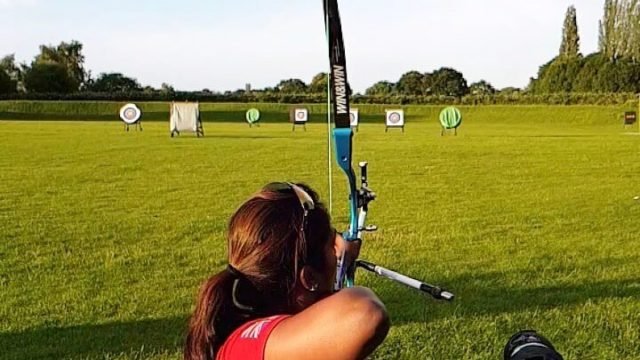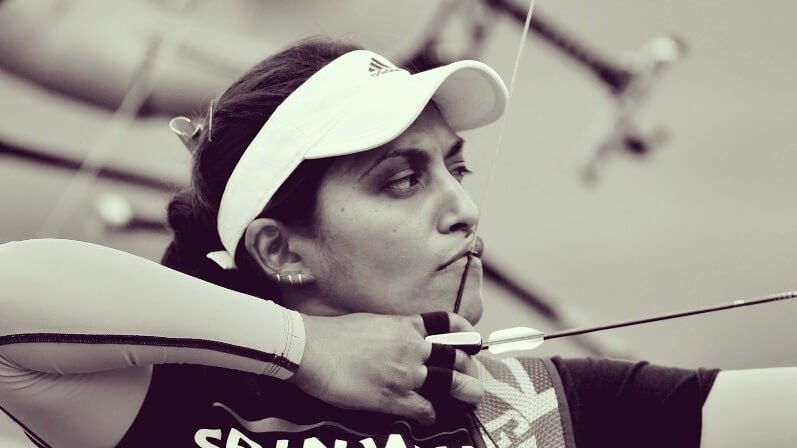
Coinciding with UK Disability History Month, Tania Nadarajah writes on her experience accessing sports and local physical activities as a wheelchair user, and how data-driven initiatives like OpenActive and Parasport can help remove barriers to participation. Tania Nadarajah is a Paralympic archer, who competed for Great Britain from 2014 until her retirement from international sport in 2021. She now works in marketing and communications for Disability Assist, as well as staying involved in sport through the British Paralympic Association Athletes' Commission and the Parasport Lived Experience Advisory Board. She is also on the board of the charity, Sportability, which provides sporting events for people with paralysis, and is passionate about making sport accessible to all.
Imagine this scenario: you want to start swimming but aren’t sure where your nearest pool is. If you’ve got a smartphone or a computer, you’re likely to do a quick search using your postcode to see what’s on offer closest to you; clicking on whatever comes top of the search results. You might look to see how much it costs and what time the pool is open, but that’s probably all you need to know before visiting. Simple enough.
But what if you need a few more questions answered before you set out for your swim? For example, is the parking suitable? Are there any steps to enter the building? Is there a changing room that you can access? Is there a toilet that you can use? Will they let someone accompany you for free? Is there a way for you to get in and out of the pool? Are there any session times when it won’t be so busy? It is important for you to know all of this before you can decide if that pool is suitable for you.
However, none of that information is on the website. You call the pool but the receptionist can only give you a few details. “Yes,” they say, “there is a lift to the changing rooms... but it’s out of order right now.” So you have to start the process all over again with the next swimming pool on the list. Suddenly, the process is not quite so straightforward.
Still feel like going for a swim?
Barriers to participation
Sadly, this is something that people with disabilities have to go through on a regular basis with all manner of day-to-day activities. When I acquired my disability in 2009 as the result of a road traffic accident and became a full-time wheelchair user, I was shocked at how difficult it was to do something new because of the additional information I needed to know in advance to decide if it was right for me. And that included the sporting and physical activity I wanted to get involved with. Something like joining a gym suddenly involved so much more research on my part. The Activity Alliance Annual Disability and Activity Survey 2022 shows that only 4 in 10 disabled people feel they can be as active as they want, in contrast to 7 in 10 non-disabled people. There are numerous reasons for this but difficulty in finding relevant information must certainly be a contributing factor. Providers will, of course, know the information but they must first use their judgement on what is useful to share and then make the information available in a way that makes it easy to attain. The huge variation in both elements is where the problem lies.

Paid-for services such as gyms, pools and exercise classes have improved in recent years. Accessibility information is becoming more readily available on websites as the value of the ‘purple pound’ is recognised – though sometimes hidden deep within the pages rather than something that is easily searchable. However, when it comes to sports clubs, charities or other organisations that rely on the contribution of volunteers, it can be much harder to access the data. My own experiences in trying to find an archery club that could accommodate a disabled archer when I first started in the sport in 2014 highlighted those difficulties. Individual clubs assess their own facilities for suitability and decide whether they include that information on their website. However, that information isn’t collated anywhere – even the ‘Club Finder’ tool on the website of national governing body Archery GB doesn’t allow you to search by accessibility. For one of the most inclusive sports out there, it’s a barrier to participation that could be so easily overcome.
The power of data
Initiatives such as OpenActive are taking an important step in providing a solution to these challenges. OpenActive helps providers to publish standardised open data on the activities they provide, which can then be fed into third-party platforms that show available activities. This gives people with disabilities the opportunity to search for and book suitable activities online. Making the process as straightforward as possible takes away some of the barriers to participation and will hopefully encourage more disabled people to become involved in physical activity.

However initiatives like this aren’t enough on their own if disabled people don’t know how to access the data. To help people to actually find activities, it’s vital to publicise the platforms that use the data and increase awareness among the desired audience. One such platform is Parasport, developed by ParalympicsGB in partnership with Toyota, which uses OpenActive data to find and collate accessible activities. I recently joined the Parasport Lived Experience Advisory Board to share my own experiences and knowledge and to help shape the Parasport programme. My hope is that this will become a leading platform that disabled users immediately recall and visit to find suitable activities, in much the same way as you might automatically go to Google if you are looking for a search engine. The more platforms that sign up to initiatives like this, the more people become used to seeing accessibility information and come to expect it as standard. For these projects to be a success, providers need to get involved and be proactive in promoting their activities to disabled people. The utopia would be when activities are designed to be as inclusive as possible from the start and that becomes the norm of how sport and activities operate from creation through to delivery. I think we are still some way off from that but, in the meantime, we can at least strive to highlight the issues and work together to make it easier for disadvantaged groups to access the relevant data and eliminate some of the more obvious barriers to participation.
Tania Nadarajah spoke on the ODI Summit 2022 panel Access to sport through data: Levelling the playing field for people with disabilities
Watch the session here:
Want to hear more from Tania? Join us on Monday 5 December, 18:00–20:00 GMT, for our event ODI Canalside Chats: Disability, data and physical activity Tania will join ODI Director of Data & Services Lisa Allen to discuss how a lack of accurate and findable information about the accessibility of facilities and activities can prevent people with disabilities from participating in physical activities, and the potential for data-driven projects such as OpenActive and Parasport to help level the playing field